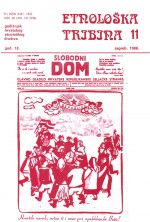Kulturni identitet Dalmacije 19. stoljeća iz perspektive Petra Nižetića (Pietra Nisitea)
Cultural Identity of the 19th Century Dalmatia as Seen by Petar Nižetić (Pietro Nisiteo)
Author(s): Jelka Vince-PalluaSubject(s): Ethnohistory, Cultural Anthropology / Ethnology, 19th Century, Identity of Collectives
Published by: Hrvatsko etnološko društvo
Keywords: cultural identity; Dalmatia; 19th century; Petar Nižetić; ethnology;
Summary/Abstract: In Dalmatia in the first half of the 19th century, Petar Nižetić — a historian, archaeologist and ethnologist — used not only philology, historiography and archaeology, but on an equal basis ethnographic data, in order to solve the problem of national origin. Certain cultural elements and their ethnographic description (for example »kolo« dance or some sport games) served him only as aids in reconstructing cultural history and answering questions about origins. Nižetić's intention was to refute the hypothesis about the Illyrian origin of the Southern Slavs, as his contribution to the discussions of national — political problematique at the time of Croatian Renaissance. In the article, the author demonstrates that Nižetić's scientific efforts and ideas were influenced by cultural and historical trends of the 19th century Europe and the general climate at the time of the formation of nation-states. The Croatian national awakening — Illyrian Renaissance — was a part of this process. Nižetić was also influenced by European, particularly Italian romantism which was close to Dalmatia both geographically and in terms of political engagement (Risorgimento and Mazzini's »Young Italy«). It inspired in Nižetić the search for own identity, cultural and national. The term »culture« is in Nižetić’s thinking treated in evolutionary perspective and in the context of unsuccessful relative dating of cultural elements, associated with the concept of »more ancient people«. His use of the concepts »development of the elements of human culture« and »degrees of development« was in accord with the prevalent idea of the century which believed in progress and almighty science and industry.
Journal: Etnološka tribina : Godišnjak Hrvatskog etnološkog društva
- Issue Year: 18/1988
- Issue No: 11
- Page Range: 33-41
- Page Count: 9
- Language: Croatian

